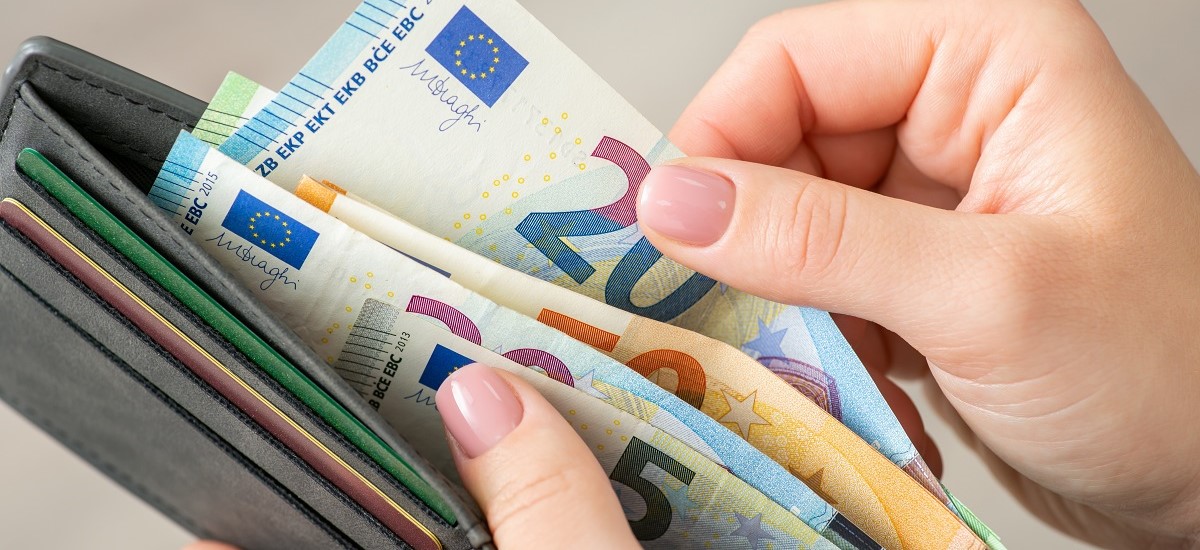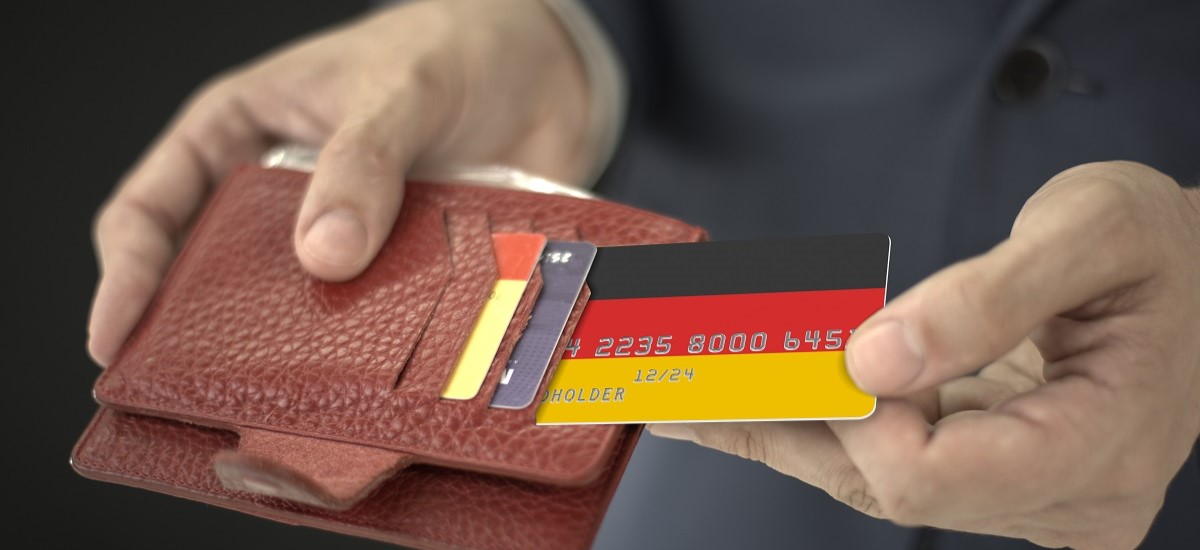How to buy train tickets in Germany
What’s the best way to buy train tickets in Germany? A handy guide including step-by-step instructions and FAQs.

If Germany is your next travel destination, you’re probably busy packing and working out a travel budget. No matter how much money you plan on spending there, it’s also important to learn the difference in financial habits between the UK and German locals.
Germans are known for being loyal to cash even in the era of digitalisation and tap-to-pay methods. However, this is beginning to change and German society is slowly morphing into a cashless one. In this article we’ll explore your options and which is more convenient, cash or card in Germany?
We’ll also show you a cost-effective way to manage your spending in Germany. For any international purchases, whether online or in person, you can rely on the Wise card. You can even withdraw cash like a local at the mid-market exchange rate for only a small, transparent fee*.
Germany is a very cash-reliant country, despite being technologically advanced. The popularity of debit cards has grown in the past few years, but cash still remains widely used.
Cash and debit cards each account for over 30% of POS payments in Germany. E-wallets follow at around 13%, while credit cards are used in less than 10% of cases. Predictions say that cash will remain important in Germany in the near future, but digital wallets will gain traction.
Tipping isn’t compulsory in Germany and it’s not considered rude if you don’t tip, especially if you’re a tourist. However, it’s appreciated if you do, since it’s a sign of being happy with the quality of service.
Locals tip in cafés, restaurants, hotels and taxis are the norm for most Germans. The usual amount is an additional 5-10% or just rounding up the bill to the nearest Euro.
You can usually include a tip when paying by card, but it’s best to leave it in cash. This way, you’re making sure that the person that served you receives it.

We’ve listed some situations where you’ll be paying for things in Germany. Here’s whether you’ll be able to pay by card, in cash or both:
| Payment for… | Card💳 | Cash 💶 |
|---|---|---|
| 🚕 Taxis3 | Usually, but they might not accept all types of cards | Yes |
| 🏪 Convenience stores4 | Usually, but smaller stores sometimes accept only cash | Yes |
| ☕ Coffee shops4 | Usually, but small cafes sometimes accept only cash | Yes |
| 🚌 Public transport5 | Usually, in big cities | Yes |
| 🍽️ Restaurants4 | Usually, but small restaurants may only accept cash | Yes |
There are over 95,000 ATMs in Germany and they’re called Geldautomat or Bankautomat. If you’re going to be visiting a big city, it will be easy to find them in shopping malls, train stations, and, of course, in banks.
German ATMs usually accept all foreign cards, but some smaller regional banks will only take German or European cards. This is usually due to the fact that they’re not equipped to communicate with global bank servers.
Many German ATMs are open 24/7. Withdrawal limits vary, but the good thing is that they usually let you choose denominations.
Your UK debit card will likely work in Germany, but keep in mind that some places don’t accept cards at all. If your UK bank is part of the Global ATM Alliance group, you can withdraw money from Deutsche Bank ATMs without paying any withdrawal fees.
As long as you go to a place that accepts cards, you’ll be able to use your UK credit card. Credit cards are used far less in Germany than in the UK, but they still accept them.

Cash is widely used in Germany and it’s often the preferred payment method. Even in big cities, some cafes and restaurants only take cash payments. This also applies to taxis, which don’t always accept all kinds of payment cards.
Despite the fact that the world is becoming completely digital, Germans are not giving up on cash. Also, a good reason to have euros on you is being able to leave cash tips whenever you feel like it.

One of the main reasons for using cards on your trip is safety. You’ll be able to enjoy your trip more since you won’t be that much of a target for pickpockets.
Although cash is still important, debit cards are the number one form of payment in Germany right now. Also, if you use your card to pay, you won’t have to deal with bringing spare euros back home.
Contactless payments are fairly common in Germany. It’s predicted that digital wallets and cards will become even more popular in the next few years.1 The limit for contactless card payments in Germany is 50 euros, just like it is in all Eurozone countries.8
Your Wise card can also be used for contactless payments in Germany. If you don’t want to carry cards with you, you can get the Wise virtual card with the same features.
Besides traditional credit and debit cards, other payment methods are also available in Germany.
Globally popular digital wallets like Apple Pay and Google Wallet are used in Germany as well. If you have one of these apps on your phone, make sure they’re updated before your trip to avoid any issues.
Germans also use other mobile payment options, such as Payback Pay and PayPal. Payback Pay is available in some other European countries as well, but it’s most popular in Germany. When it comes to PayPal, it’s used for online transactions in Germany more than in any other European country or the USA.
For an additional layer of security, you could add your Wise virtual card to your wallet. It has all the benefits of a regular Wise card, but it exists in your phone only. You can freeze your Wise virtual card after every transaction, for extra security too.
Germany is one of Europe’s main markets for buy now pay later options and they’re expected to get even more popular. Some of the most used BNPL providers are Klarna and PayPal.

If you had to choose between using cash or cards in Germany, cash would take the win. It’s still a very popular payment method, even though Germans use both cards and digital payments rather frequently. If you don’t want to rely on it completely, make sure you have at least some on you during your trip.
However, the best solution for spending in Germany is combining the safety of cards and the popularity of cash. Cards can be used almost anywhere in big cities, but you still need cash for tips, small purchases and some cash-only businesses.
Want to spend like a local in Germany and in 150+ countries without worrying about exchange rates and hidden fees? The Wise card might be just the option you were looking for.
The Wise card can be used for international payments, from your accommodation costs to daily expenses. It automatically converts your pounds at the mid-market exchange rate with only a small, transparent currency conversion fee*.
Which means you have more money to spend on souvenirs or schnitzel!
You can also use your Wise card to easily withdraw cash from the ATMs in Germany. Each month, you can make 2 withdrawals of up to 200 GBP for free. After that, a small fee of 0.5 GBP is added to each withdrawal*.
Here are some of the most frequent questions about using cash or cards in Germany:
In general yes, but card payments are also rather common.
Yes, you can use UK-issued debit cards for spending in Germany.
Yes, you can tap-to-pay in any business that accepts cards.
Visa cards are widely accepted in Germany, so you shouldn’t have any problem using them.
Yes, you can use your Wise card in Berlin, Munich and anywhere else in Germany to enjoy auto-conversion on all your holiday spending at the mid-market rate for a small, transparent fee*.
Why not also check out the Wise account? There’s no limit on how much you can hold in your Wise account and it can hold over 40+ currencies.
Sources used:
Sources last checked on date: 11-Jul-2024
*Please see terms of use and product availability for your region or visit Wise fees and pricing for the most up to date pricing and fee information.
This publication is provided for general information purposes and does not constitute legal, tax or other professional advice from Wise Payments Limited or its subsidiaries and its affiliates, and it is not intended as a substitute for obtaining advice from a financial advisor or any other professional.
We make no representations, warranties or guarantees, whether expressed or implied, that the content in the publication is accurate, complete or up to date.

What’s the best way to buy train tickets in Germany? A handy guide including step-by-step instructions and FAQs.

Check out our handy guide to using PayPal in Germany, including what fees you can expect.

This guide will provide an overview of tax-free shopping in Germany so you can receive your VAT refund in cities like Munich and Berlin and save money.

If you’re planning to visit the vibrant capital of Germany, you should definitely go around Pride time. Berlin has long been at the forefront of LGBTQIA+...

Read our essential guide to ATMs in Germany, including where to find them, exchange rates, withdrawal limits and how to avoid fees.

A handy guide on how to buy a German sim card, including available mobile network operators and how to buy a German sim card online.